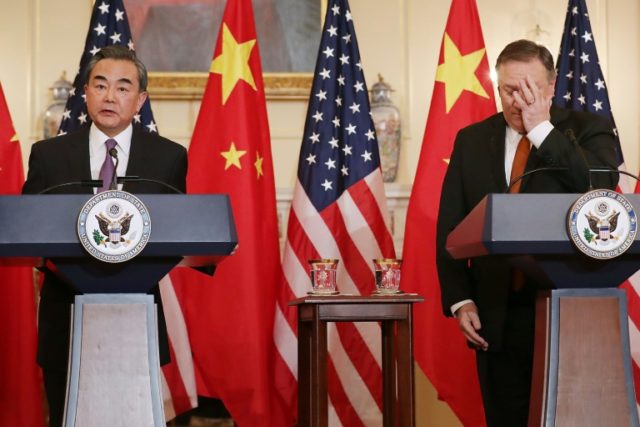After meeting with North Korean dictator Kim Jong-un in Pyongyang on Sunday, Secretary of State Mike Pompeo spoke with Chinese Foreign Minister Wang Yi and a senior Chinese cabinet official named Yang Jiechi.
Wang slammed the U.S. for escalating “trade frictions” with China and supporting Taiwan, urging Pompeo to help mend relations between the two countries.
The Associated Press on Monday described the meeting between Pompeo and Wang as “polite but edgy” – edgy enough to have reporters escorted from the conference room in Beijing before the two got down to business.
The L.A. Times went with “chilly” to describe the meeting and called Wang’s public remarks “unusually sharp.” The New York Times found Wang’s words “unusually blunt” and Pompeo’s response “tart.” The Wall Street Journal said the meeting between Wang and Pompeo included some “testy words.”
The NYT speculated the Chinese are still smarting from Vice President Mike Pence’s sharp criticism during a speech to the Hudson Institute last Thursday. The Chinese scuttled an expected meeting between Pompeo and President Xi Jinping, sending Yang Jiechi instead to express Xi’s displeasure to the visiting Secretary of State.
China is also perpetually anxious about being cut out of the North Korean denuclearization process and might have felt a display of diplomatic muscle was needed after Pompeo’s visit to Pyongyang, where he is believed to have set the stage for another summit between dictator Kim Jong-un and U.S. President Donald Trump. Pompeo also departed Pyongyang with an agreement to allow international inspectors at North Korean missile sites, an achievement that appears to leave China on the sidelines, especially if Chinese inspectors are not invited to participate in the international denuclearization verification process.
Wang complained the U.S. is “constantly interfering in China’s internal and external affairs,” which sounds like a combination of petulance over the Trump administration’s accusations of Chinese meddling in the 2018 U.S. election and anger at American freedom of navigation patrols in the South China Sea. China defied international court rulings and territorial claims by other Asian nations to seize virtually the entire region as Chinese territory and is responding to U.S. patrols with increasing aggression.
Wang was particularly critical of U.S. support for Taiwan. The Trump administration angered Beijing last week by approving a $330 million arms shipment to Taiwan in defiance of Chinese demands to cancel the deal.
“Recently, as the U.S. side has been constantly escalating trade friction toward China, it has also adopted a series of actions on the Taiwan issue that harm China’s rights, and has made groundless criticism of China’s domestic and foreign policies,” Wang said.
“These actions have affected the mutual trust between both sides, and have cast a shadow over the prospects for China-U.S. relations, which completely go against the interest of our two peoples. We demand that the U.S. side stop these kinds of mistaken actions,” he continued.
Pompeo responded that the United States has a “fundamental disagreement” with China on the issues Wang listed.
“We have grave concerns about the actions China has taken,” he said.
Pompeo also expressed regrets that China chose not to participate in a “strategic dialogue” originally scheduled for October. Wang insisted it was the U.S. that canceled the dialogue, not China.
The New York Times noticed that Chinese state media was much less belligerent in support of Wang than might have been expected, confining itself to a little bluster about the United States being sadly mistaken if it thinks it can run the same economic warfare play against China that ruined the Soviet Union:
“We need to refrain from escalating friction with the U.S. and exaggerating the atmosphere of strategic confrontation,” the usually strident newspaper Global Times said on Monday.
At the same time, the paper struck a confident tone, saying the United States would not be able to challenge China the way it did the Soviet Union, by outspending on military weapons. A prominent international relations professor at Renmin University, Jin Canrong, was quoted as saying the American financial elite would refuse to forsake the Chinese market.
“U.S. allies like Europe and Japan have been largely silent,” Professor Jin said in an interview published in the Global Times. “A cold war needs two major blocs against each other, but the U.S. allies are not forming a bloc with it against China.”
The U.S. has good reasons for concern, not only due to evidence China and Russia have been helping North Korea cheat on sanctions, but because China is likely to join North Korea in pushing for incremental sanctions relief as a reward for Pyongyang’s good behavior. The Trump administration has stated it wants full sanctions pressure to remain until complete and verifiable denuclearization has been achieved, citing North Korea’s long history of using trivial concessions to sabotage sanctions.
Korea University professor Nam Sung-wook told the Wall Street Journal that Kim Jong-un is probably trying to firm up support from China and Russia before his second summit with President Trump. “Having Putin and Xi Jinping on your side will mean something in talks with Trump,” he predicted.
South Korean President Moon Jae-in said on Monday that Xi is expected to visit North Korea and meet with Kim “soon.” It might be part of U.S. strategy to focus on disputes with China in advance of that meeting to reduce the value of Xi’s support in Kim’s mind.

COMMENTS
Please let us know if you're having issues with commenting.